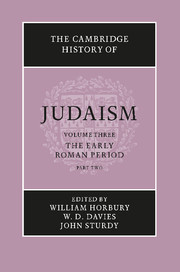Book contents
- Frontmatter
- 1 The archaeology of Palestine 63 bce–ce 70
- 2 The Herodian Temple
- 3 Recent archaeology in Palestine: achievements and future goals
- 4 The contribution of Jewish inscriptions to the study of Judaism
- 5 The social, economic and political history of Palestine 63 bce–ce 70
- 6 The Diaspora in the Roman period before ce 70
- 7 The Gentiles in Judaism 125 bce–ce 66
- 8 Gentiles as seen by Jews after ce 70
- 9 The synagogue
- 10 The Temple and the synagogue
- 11 The early liturgy of the synagogue
- 12 Women in the synagogue
- 13 The Pharisees
- 14 The Sadducees – their history and doctrines
- 15 The Essenes
- 16 The baptist sects
- 17 The troublemakers
- 18 The Samaritans and their sects
- 19 Galilean Judaism and Judaean Judaism
- 20 Jesus: from the Jewish point of view
- 21 Paul: from the Jewish point of view
- 22 Jewish Christianity
- 23 Apocalyptic: the disclosure of heavenly knowledge
- 24 The Qumran sectarian writings
- 25 The Dead Sea Scrolls and pre-Tannaitic Judaism
- 26 Prayer in the Qumran Texts
- 27 Philo of Alexandria
- 28 Josephus (ce 37–c. 100)
- 29 The rabbi in second-century Jewish society
- 30 The Hellenistic–Roman Diaspora ce 70–ce 235: the archaeological evidence
- 31 The legacy of Egypt in Judaism
- 32 Jewish elements in gnosticism and magic c.ce 70–c.ce 270
- Bibliographies
- Index
- References
32 - Jewish elements in gnosticism and magic c.ce 70–c.ce 270
Published online by Cambridge University Press: 28 March 2008
- Frontmatter
- 1 The archaeology of Palestine 63 bce–ce 70
- 2 The Herodian Temple
- 3 Recent archaeology in Palestine: achievements and future goals
- 4 The contribution of Jewish inscriptions to the study of Judaism
- 5 The social, economic and political history of Palestine 63 bce–ce 70
- 6 The Diaspora in the Roman period before ce 70
- 7 The Gentiles in Judaism 125 bce–ce 66
- 8 Gentiles as seen by Jews after ce 70
- 9 The synagogue
- 10 The Temple and the synagogue
- 11 The early liturgy of the synagogue
- 12 Women in the synagogue
- 13 The Pharisees
- 14 The Sadducees – their history and doctrines
- 15 The Essenes
- 16 The baptist sects
- 17 The troublemakers
- 18 The Samaritans and their sects
- 19 Galilean Judaism and Judaean Judaism
- 20 Jesus: from the Jewish point of view
- 21 Paul: from the Jewish point of view
- 22 Jewish Christianity
- 23 Apocalyptic: the disclosure of heavenly knowledge
- 24 The Qumran sectarian writings
- 25 The Dead Sea Scrolls and pre-Tannaitic Judaism
- 26 Prayer in the Qumran Texts
- 27 Philo of Alexandria
- 28 Josephus (ce 37–c. 100)
- 29 The rabbi in second-century Jewish society
- 30 The Hellenistic–Roman Diaspora ce 70–ce 235: the archaeological evidence
- 31 The legacy of Egypt in Judaism
- 32 Jewish elements in gnosticism and magic c.ce 70–c.ce 270
- Bibliographies
- Index
- References
Summary
GNOTICISM
Jewish elements in gnosticism: the problem defined
It should be obvious even from a cursory reading of Gnostic literature that there are Jewish elements in Gnosticism. These elements are of many different kinds, and may be classified in many different ways, but for our present purposes it will be sufficient to distinguish two broad categories – biblical and non-biblical. To the first category belong the quotations from, or allusions to, the Old Testament in the Gnostic texts. (For convenience we may include here also much Gnostic exegesis of the Old Testament.) Into the second category may be put all those Gnostic ideas, motifs, literary genres, technical terms and formulae which have been paralleled more or less convincingly in post-biblical Jewish literature. It is important to realize that the significance of an element will vary according to the category into which it falls. The Jewishness of elements in category one is not, in the last analysis, open to question. We may speculate on how Old Testament materials found their way into Gnosticism (whether through Christianity, pre-Christian Jewish Gnosticism, or by direct borrowing from Judaism), but that they are Jewish can hardly be disputed. The Jewishness of elements in category two, on the other hand, is often problematic. We are dealing here in the first instance with parallelism, and that creates a host of problems. We must establish that the parallelism we perceive is real and significant – in itself no small task. Then we must face the question of origins: who has borrowed from whom? There is a tendency for scholars to assume that in cases of parallelism Gnosticism is indebted to Judaism.
- Type
- Chapter
- Information
- The Cambridge History of Judaism , pp. 1052 - 1078Publisher: Cambridge University PressPrint publication year: 1999
References
- 4
- Cited by

